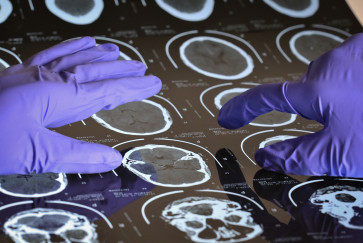Northwestern University Trustee Kimberly K. Querrey (’22, ’23 P) and the Louis Simpson Trust have made a new $121 million gift to Northwestern to advance biomedical discovery at the Feinberg School of Medicine, reinforce the University’s position as a global research powerhouse and expand executive education at the Kellogg School of Management.
Querrey and her late husband, Louis A. Simpson ’58 (’96 P), have built an inspiring philanthropic legacy at Northwestern over the past two decades. The new gift announced today brings their total contributions to the University to more than $379 million.
Simpson was a University trustee, alumnus, parent and adjunct professor.
“Lou valued being a part of the Northwestern community. He cherished his relationships with the students, scientists and others he met through the University,” Querrey said. “He was particularly proud of Northwestern’s groundbreaking discoveries in biomedical science, engineering and innovation. I’m thrilled to honor Lou with a gift that will expand on this important work."
Northwestern University President Michael H. Schill said he is deeply honored by the continued generosity of Querrey and her late husband.
“I am so grateful to Kimberly Querrey and Lou Simpson, two of Northwestern’s greatest champions,” President Schill said. “Northwestern’s rapid progress over the last decade simply would not have been possible without them. This new gift continues their legacy of visionary support, and the impact will be far reaching.”
A significant portion of the new gift — $100 million — will go toward supporting biomedical research at Feinberg.
“Our philanthropic investments focus on helping people,” Querrey said. “Lou and I often discussed the importance of improving the quality of life, particularly for those facing medical challenges. The physicians, scientists and engineers at Northwestern do groundbreaking, innovative work, realizing our vision of positively affecting people’s lives.”
The gift will support four new initiatives at Feinberg:
- $64 million to support the construction of a 19-level tower with 15 lab floors, expanding the Louis A. Simpson and Kimberly K. Querrey Biomedical Research Center and making it the largest academic biomedical research facility in the world. The center, which opened on the Chicago campus in June 2019, brings physicians together with top-ranked clinical affiliates to solve complex biomedical challenges.
- $25 million to create and endow the Simpson Querrey Lung Institute for Translational Science. This institute will be directed by Scott Budinger, the Ernest S. Bazley Professor of Airway Diseases and chief of pulmonary and critical care in the department of medicine at Feinberg. The institute will advance new basic discoveries in pulmonary medicine for the benefit of patients.
- $10 million to create and endow the Simpson Querrey Center for Neurovascular Sciences. This center will be directed by Farzaneh Sorond, vice dean for faculty affairs at Feinberg and the Dean Richard H. Young and Ellen Stearns Young Professor and division chief for stroke and neurocritical care in the Ken and Ruth Davee Department of Neurology. The center will advance new ideas related to neurovascular diseases across medical disciplines.
- $1 million to support the Kimberly Prize in Biochemistry and Molecular Genetics, which Querrey established in 2022 in honor of Simpson. Jennifer Doudna recently was named the inaugural prize winner. The annual prize of $250,000 is given by the Simpson Querrey Institute for Epigenetics, directed by Ali Shilatifard, the Robert Francis Furchgott Professor and chair of biochemistry and molecular genetics, and administered by Feinberg.
“Kimberly is a visionary philanthropist who cares deeply about groundbreaking science and biomedical research,” said Dr. Eric G. Neilson, vice president for medical affairs and Lewis Landsberg Dean at Feinberg. “This generous gift will enable us to advance our research mission innovatively and imaginatively to transform human health by accelerating the pace of discovery for the benefit of clinical medicine.”
In addition, $11 million of the new gift will support the Querrey Simpson Institute for Bioelectronics, under the direction of John Rogers, the Louis Simpson and Kimberly Querrey Professor of Materials Science and Engineering, Biomedical Engineering and Neurological Surgery.
“I continue to be profoundly moved by Kimberly’s visionary support for our institute and our ongoing research at the intersection of engineering and medicine,” said Rogers, a bioelectronics pioneer. “This incredible investment will accelerate our work, geared fundamentally around unmet needs in patient care, to improve health outcomes at reduced costs, for developed and developing countries alike.”
The gift also includes $10 million for executive education at Kellogg, where Simpson had served as senior fellow, adjunct professor of finance and member of the school’s Asset Management Practicum advisory council.
“This generous gift will greatly expand and advance Kellogg’s mission to provide the highest caliber, leading-edge experience in business education,” said Francesca Cornelli, dean of Kellogg.
Broad philanthropic impact
Over the years, Querrey and Simpson’s gifts have benefited multiple areas across Northwestern, including Feinberg, Kellogg and the McCormick School of Engineering, as well as scholarships, endowed academic positions, athletics and recreation, and building projects.
Their giving has focused on initiatives that help people, propel Northwestern’s academic excellence, spur innovation and entrepreneurship, and ensure that the research enterprise flourishes. Querrey and Simpson have funded advances in some of the most promising emerging fields within science and medicine.


